W branży food nie ma tygodnia bez newsa dotyczącego kolejnego ekorozwiązania. Wielorazowe opakowania na pizzę, wtórne wykorzystanie fusów po kawie czy wprowadzanie w firmie własnych upraw – producenci, sprzedawcy czy restauratorzy nieustannie szukają coraz to lepszych możliwości prowadzenia swojego biznesu w sposób bardziej zrównoważony. Zbliżający się Dzień Bez Opakowań Foliowych (23 stycznia) to świetna okazja do przyjrzenia się dostępnym produktom i rozwiązaniom. Czy rzeczywiście odmieniają one los naszej planety?
Ekoprodukty
Czysta etykieta, krótki skład, jasne pochodzenie, a najlepiej lokalność. Temat ekologii w kontekście samego produktu od kilku lat nieustannie pojawia się na naszych ustach. O istocie tego podejścia przekonali się także sprzedawcy i restauratorzy, którzy chętnie komunikują zielone aspekty swojej oferty. Sam produkt to jednak nie wszystko. Dużą wagę przykładamy dziś również do opakowań, które – ciesząc się różnymi certyfikacjami czy innowacyjnymi funkcjonalnościami – przykuwają wzrok nabywców.
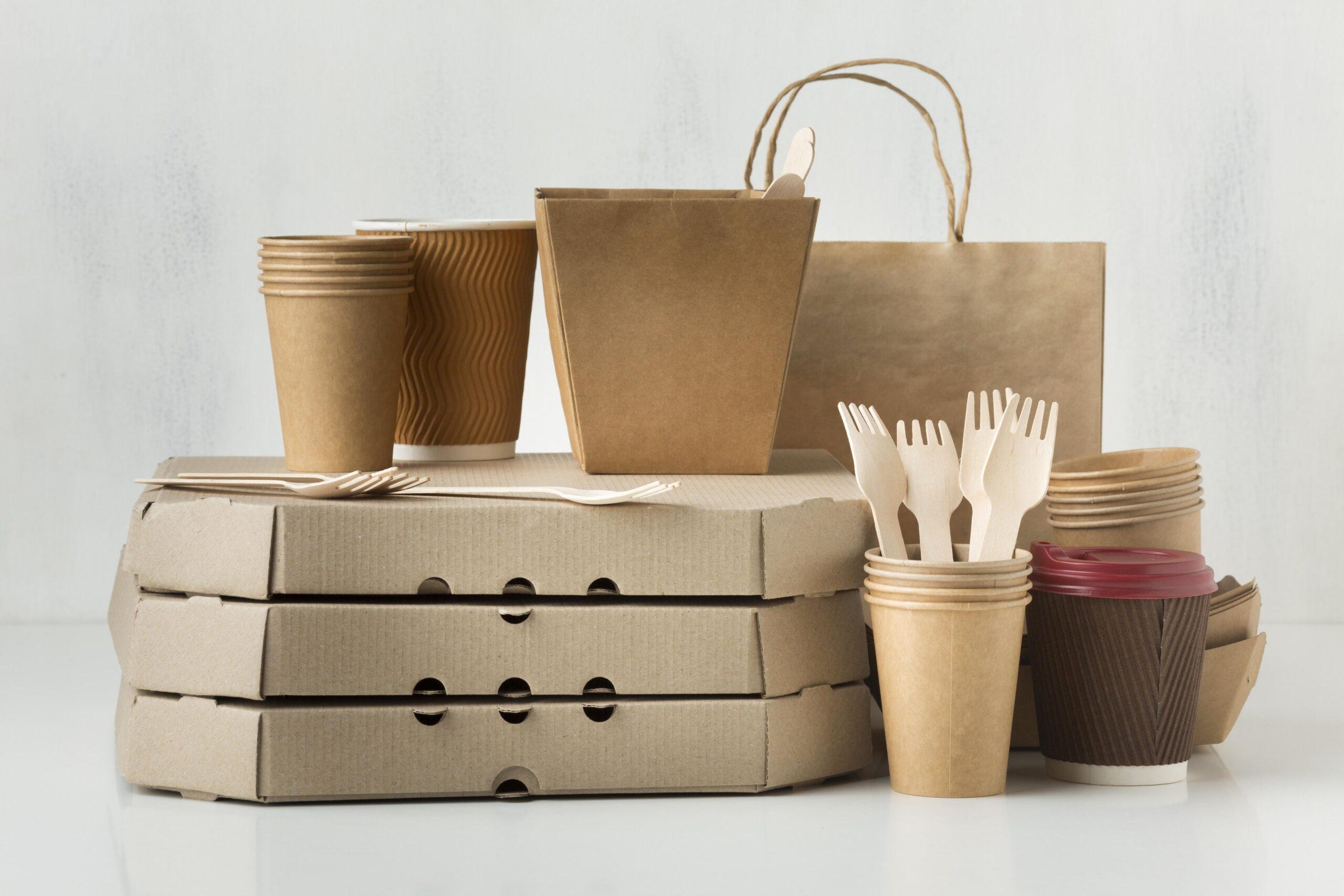
źródło: Freepik
Nie sięgając bardzo daleko, warto zwrócić uwagę, że jeszcze kilka lat temu papierowe opakowania w zamawianiu dań na wynos czy przy zakupie produktów w sklepach spożywczych nie były częste. Dziś w wielu kategoriach produktowych stają się wprost standardem.
Obserwując producentów, starających się walczyć z ograniczeniem wykorzystywania plastiku, można odnieść wrażenie, że niektórzy biorą udział w swego rodzaju wyścigu. Kto zaproponuje mniej plastikowe opakowanie? Które będzie lepsze dla naszej planety? Choć analizy składu opakowań bywają imponujące, to niekiedy cały proces odbywa się kosztem funkcjonalności opakowań. Zbyt cienki plastik, w którym zamkniemy 1,5 l wody mineralnej, przyprawia o zawrót głowy niejednego konsumenta.
Odpowiedzią na plastik jest oczywiście szkło, które coraz większe zastosowanie znajduje nie tylko w przypadku butelek na napoje. Ciekawym przykładem świadomego wyboru szkła w zamian za plastik, jest historia marki FRITZ-KOLA, którą słusznie kojarzymy z proekologicznym podejściem. Odpowiedzialność za środowisko naturalne to jedna z idei stojących za tymi napojami. Od początku istnienia firmy, FRITZ-KOLA sprzedawana jest w szkle, dzięki czemu butelki można ponownie wykorzystywać nawet kilkadziesiąt razy.
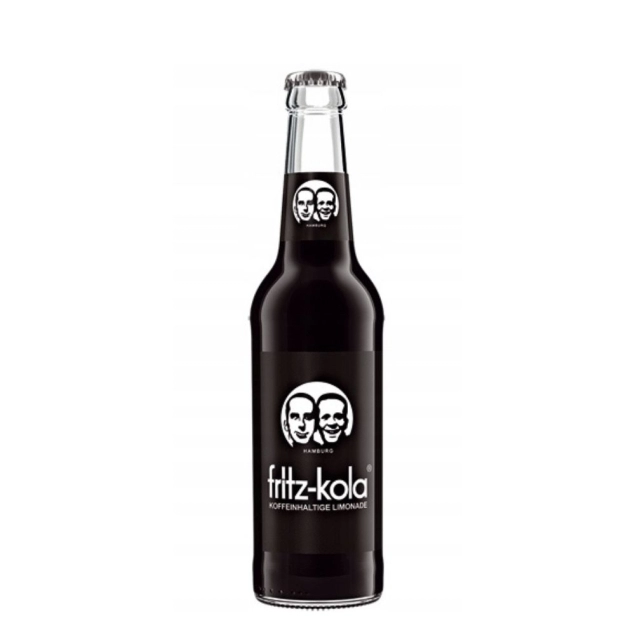 źródło :fritz-kola.com/en/downloads
źródło :fritz-kola.com/en/downloads
Ciekawym zjawiskiem w kontekście wykorzystania alternatyw plastiku w branży food, jest popularyzacja szklanych lunchboxów. Jeszcze kilka lat temu absolutna większość pudełek na drugie śniadanie czy obiad do szkoły lub pracy była plastikowa. Dziś, choć ciągle częściej wybierane są plastiki, szkło coraz chętniej zyskuje swoich zwolenników w różnych grupach wiekowych.
Co jeśli nie szkło? Możliwości jest co najmniej kilka, a wśród nich woskowijki do zawinięcia drugiego śniadania do pracy, drewniane i bambusowe sztućce czy na przykład otrębowe talerzyki. Te ostatnie, doskonałe na wiosennego grilla czy nawet cocktail party, choć początkowo szokowały, to finalnie rzeczywiście spotkały się z zainteresowaniem konsumentów. Nie sposób pominąć również tematu zastąpienia plastikowych słomek papierowymi, które – choć początkowo wzbudzały sporo kontrowersji, dziś stały się już standardem. Choć wśród nas ciągle jest wielu fanów plastikowych słomek, to trzeba przyznać, że na ich widok raczej odczujemy zdziwienie.
Gorącym tematem w branży food w ostatnich tygodniach była nowość zaproponowana przez warszawską restaurację – PollyPizza – która wprowadziła wielorazowe opakowania na pizzę. Czy rozwiązanie to rzeczywiście przyjmie się na stałe w naszym środowisku? Na ten moment trudno jeszcze wyrokować, jednak z pewnością trend przechodzenia z jednorazowych na wielorazowe opakowania, jest coraz bardziej dostrzegalny na rynku.
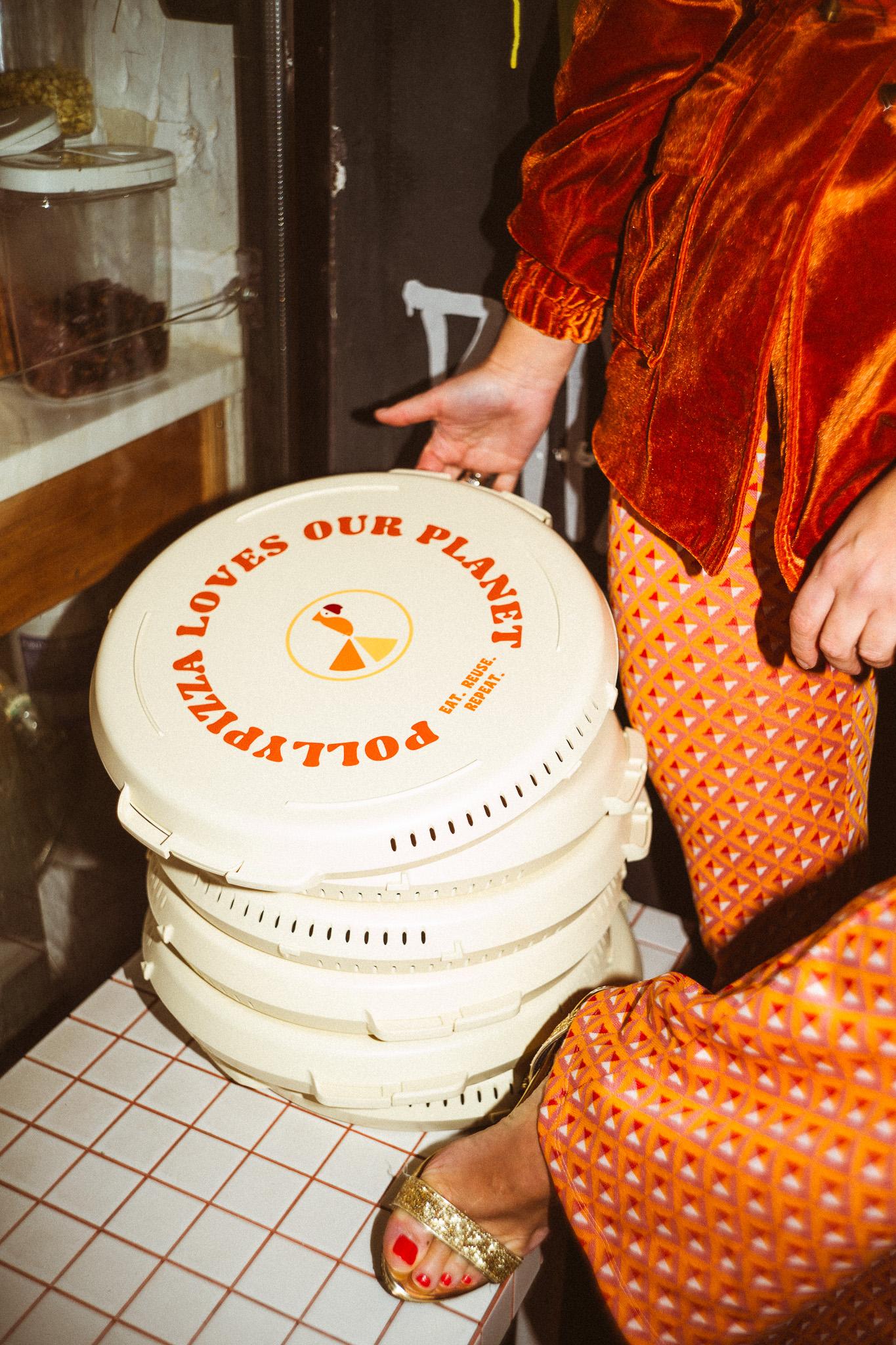
źródło: PollyPizza
Ekorozwiązania
Za kawę w swoim kubku zapłacisz mniej – takie hasła pojawiały się m.in. w komunikacji Żabki, która już kilka lat temu zachęcała klientów do korzystania z oferty ciepłych napojów, przychodząc do wybranego punktu z własnym kubkiem. Od niedawna w ofercie Żabki znaleźć można także kubek wielorazowy. Zdaniem firmy takie rozwiązanie ma przynieść korzyść zarówno dla środowiska jak i konsumenta, który za gorący napój zapłaci 1 zł mniej.
Jednym z ekorozwiązań, na które decydują się czasem restauratorzy jest wprowadzenie do lokalu własnych upraw. Zdrowsze i bardziej ekologiczne zioła czy warzywa to działanie wymagające, jednak przynoszące określone benefity. O takich restauracjach chętnie się również mówi, co nie pozostaje bez wpływu na popularność miejsca. Warto podkreślić, że coraz chętniej na ekologiczne uprawy decydują się również zwykli konsumenci, którzy kawałek ogródka przeznaczają na własne pomidory, ogórki i inne sezonowe warzywa. Trend na to, co swoje, ekologiczne, sprawdzone jest więc znacznie szerszy.
Jeszcze jakiś czas temu temat wtórnego wykorzystywania fusów po kawie brzmiał abstrakcyjnie. Dziś przestaje on już dziwić. Użyźnianie gleby, a może przetworzenie odpadów na zupełnie nowe produkty? Możliwości jest dziś co najmniej kilka, a marki chętnie to wykorzystują. Przykładem jest współpraca Starbucksa i EcoBean, w ramach której ze zużytych fusów po kawie powstają… słomki!
Choć „zielonych” alternatyw dla foliowych opakowań i nieekologicznych praktyk jest dziś pod dostatkiem, to warto pamiętać o tym, jak dużym problemem w całej dyskusji o ekopodejściu, pomimo wielu kampanii i projektów, jest marnowanie żywności. Według danych zebranych przed Foodsi, tylko w Polsce rocznie marnuje się blisko 5 milionów ton jedzenia. Wprowadzanie nawet najbardziej wyszukanych rozwiązań na rzecz środowiska winno więc wiązać się z szerszym spojrzeniem na temat ekologicznego podejścia w rynku spożywczym i gastronomicznym. Niekiedy może się okazać, że najprostsze rozwiązania są dla nas najtrudniejsze do wdrożenia. Niemniej, duże ukłony w stronę tych przedsiębiorstw, które swoją codzienną pracą i decyzjami przyczyniają się do budowania zielonej przyszłości naszej planety. Wierzymy, że wspólnymi staraniami możemy mieć realny wpływ na środowisko.
Temat marnowania żywności poruszaliśmy w poprzednim materiale: foodanddesign.pl/skala-i-przyczyny-marnotrawstwa-zywnosci-w-gastronomii/.
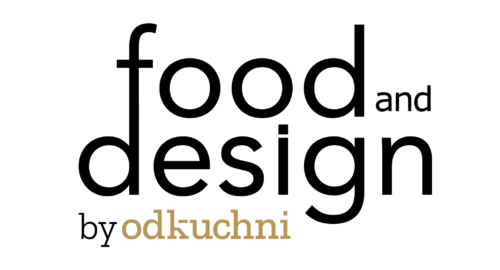
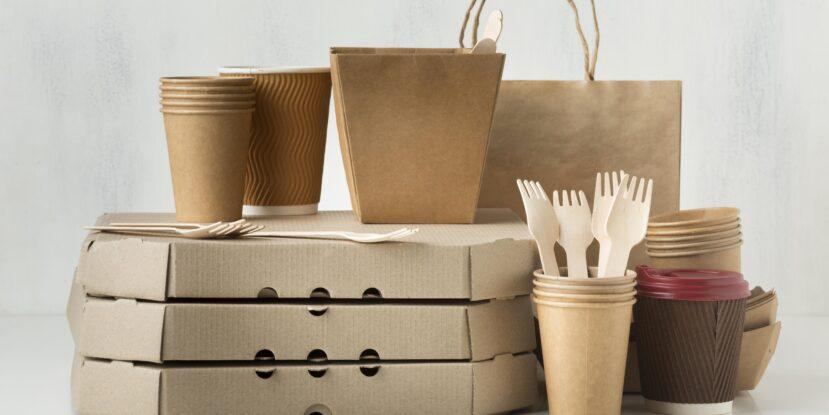
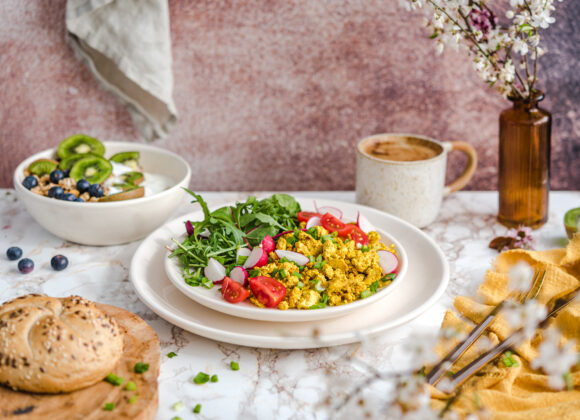


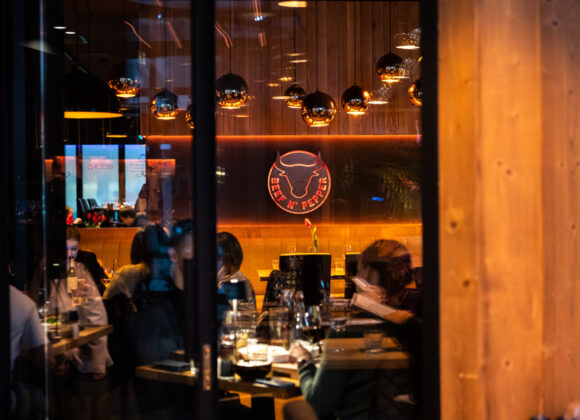
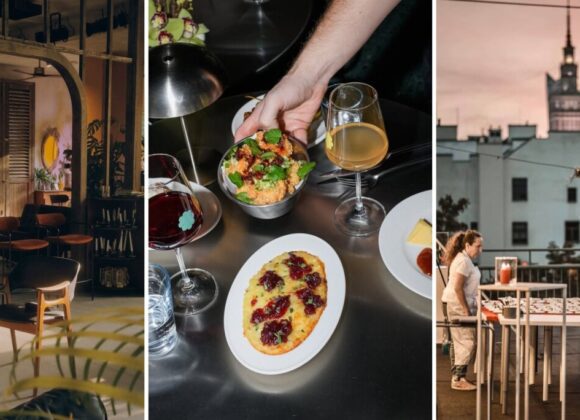
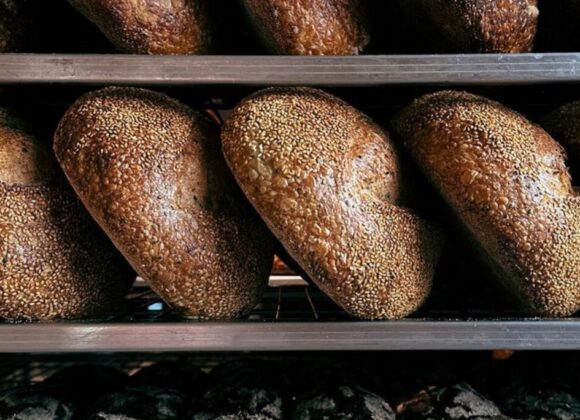


 Młodszy specjalista ds. komunikacji marketingowej i PR.
Młodszy specjalista ds. komunikacji marketingowej i PR.


 Absolwent Uniwersytetu Warszawskiego oraz Szkoły Głównej Gospodarstwa Wiejskiego. W branży HoReCa od ponad 10 lat. Przez lata związany z Grupą Trip, Sobienie Królewskie Golf and Country Club oraz restauracją Florentin w Warszawe.
Absolwent Uniwersytetu Warszawskiego oraz Szkoły Głównej Gospodarstwa Wiejskiego. W branży HoReCa od ponad 10 lat. Przez lata związany z Grupą Trip, Sobienie Królewskie Golf and Country Club oraz restauracją Florentin w Warszawe. Absolwentka Wydziału Architektury Politechniki Warszawskiej na kierunku Architecture for Society of Knowledge oraz Komunikacji Wizualnej na Politecnico di Milano. Specjalistka od budowania nastroju. Doświadczenie zdobywała w kraju i zagranicą podczas licznych warsztatów międzynarodowych (Sevilla, Lizbona, Florencja), stypendium na La Sapienza (Rzym) oraz pracując m.in. w Carmi e Ubertis i ADM Milano.
Absolwentka Wydziału Architektury Politechniki Warszawskiej na kierunku Architecture for Society of Knowledge oraz Komunikacji Wizualnej na Politecnico di Milano. Specjalistka od budowania nastroju. Doświadczenie zdobywała w kraju i zagranicą podczas licznych warsztatów międzynarodowych (Sevilla, Lizbona, Florencja), stypendium na La Sapienza (Rzym) oraz pracując m.in. w Carmi e Ubertis i ADM Milano.








 Menedżer z wieloletnim doświadczeniem w branżach kosmetycznej, spożywczej, dziecięcej. W trakcie swojej kariery związany z firmami takimi jak: L’Oreal, Samsung, Danone-Nutricia, Unilever. W ciągu swojego życia zawodowego odpowiadał między innymi za rozwój sprzedaży i contentu eCommerce w Polsce i krajach Europy Środkowo-Wschodniej.
Menedżer z wieloletnim doświadczeniem w branżach kosmetycznej, spożywczej, dziecięcej. W trakcie swojej kariery związany z firmami takimi jak: L’Oreal, Samsung, Danone-Nutricia, Unilever. W ciągu swojego życia zawodowego odpowiadał między innymi za rozwój sprzedaży i contentu eCommerce w Polsce i krajach Europy Środkowo-Wschodniej. 

























































